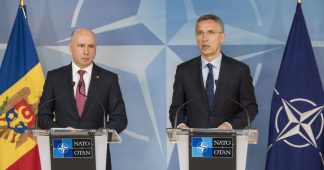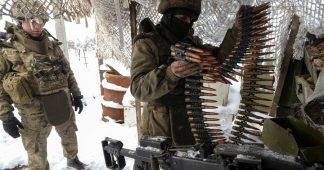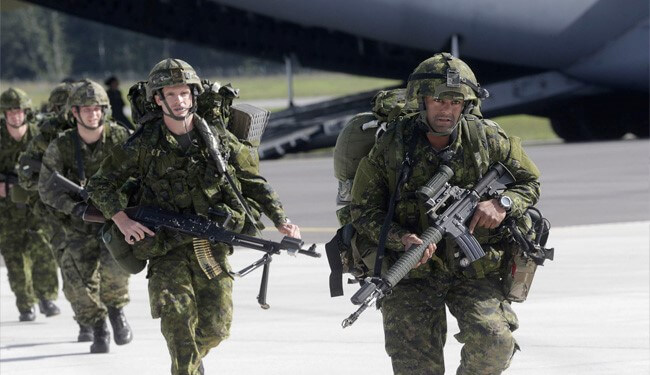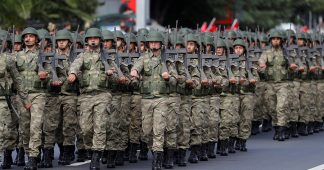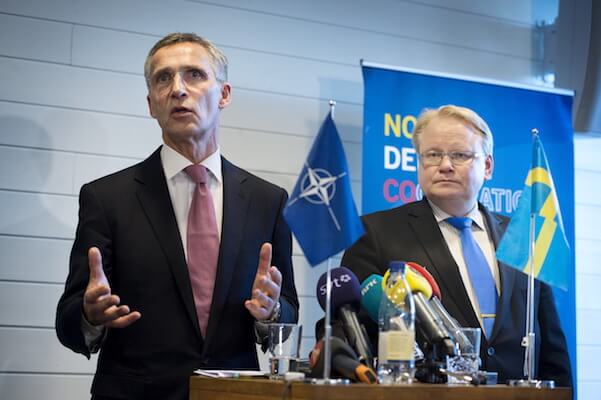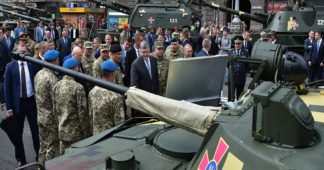Ukraine Gets Official NATO Status: Weighing Up the Pros and Cons
By Peter KORZUN
13.03.2018
NATO has granted Ukraine the status of an aspirant country. Macedonia, Georgia, and Bosnia-Herzegovina have similar status. This means Kiev has been offered a real chance to make its dreams come true. The next step will be obtaining its Membership Action Plan (MAP), a set of criteria to meet before the country is allowed to join. It is tailored to each applicant country’s individual profile. This type of plan can be granted at any time; there is no need to wait for summits or ministry-level meetings. Macedonia and Bosnia-Herzegovina are aspirants with a MAP.
Last summer, Ukraine’s parliament (Rada) adopted a resolution recognizing full membership in NATO as a foreign policy goal. In 2008, NATO agreed that Ukraine and Georgia should become members at a future date.
The Swiss newspaper Le Temps recently reported that hundreds of US and Canadian military instructors have been training Ukrainian personnel at the Yavorov firing range since 2015. Not long ago they were joined by British and Lithuanian trainers. Roughly 6,000 Ukrainian servicemen have undergone training there in order to expedite the process of meeting the requirements set by NATO. The US Navy operates a facility in Ochakov. This month, the State Department approved the possible sale of Javelin anti-tank missiles to Ukraine. The announcement preceded a statement made by Kurt Volker, the US special envoy to Ukraine, in which he offered to disband the self-proclaimed republics in eastern Ukraine.
This is all part of a broader picture. On March 2, Ukraine, Moldova, and Georgia announced the formation of an alliance to counter Russia. Chisinau is to cozy up as close to NATO as it can. The Moldovan government has announced its decision to buy lethal weapons from countries in that alliance. The US Navy operates a facility at the Bulboaca training base.
The calls for Georgia’s membership are getting louder in the US. Tbilisi’s NATO bid has been openly supported by the Trump administration. It has been reported recently that Georgia is to adopt a fast-track approach that will expedite its entrance into NATO. This policy has been recommended by the Heritage Foundation think tank. Secretary-General Jens Stoltenberg, has said that nothing stands in the way of Georgia joining the bloc.
This move is clearly intended to provoke Russia. Official status in the alliance is one step on the way to membership. If the policy goal is expansion at any cost, then that’s a step in the right direction. But will it benefit NATO? Make it stronger? Hardly.
Let’s take a look at the facts. Ukraine’s economy is in a funk. It depends on the West for help. Kiev already spends much more than the 2% of GDP required for defense allocations, in accordance with the recently approved NATO standard. The West will have to help Ukrainian taxpayers shoulder the burden. Besides anti-tank systems, Ukraine’s military lacks much of the weaponry and equipment a modern force is supposed to have in its inventory. As a result, its soldiers do not have the needed skills to operate these sophisticated, up-to-date systems. Training Ukrainian servicemen is a massive, onerous project.
Kiev wants to be in full compliance with NATO standards by 2020. It’s hard to believe it will be able to meet this deadline. Ukrainian analysts claim that the progress that was reported as part of the transformation of its military is nothing but a myth. Natan Chazin, a former advisor to the chief of the general staff of Ukraine’s armed forces, believes the military reform has gone nowhere. Washington and its NATO allies now find themselves between a rock and a hard place. Last month, the New York Times published an extensive article on corruption in the ranks of Ukraine’s military.
And it’s not just the armed forces. According to the Brookings Institute, the reforms in Ukraine have foundered. The IMF has suspended its aid because corruption continues to plague the country. Ukraine’s ruling circles of Western support. There are a multitude of reasons why its Western partners are frustrated by the way that country is being run.
The Atlantic Council emphasizes the fact that Ukrainian politicians are embracing extremist rhetoric. The country’s commitment to democracy is being questioned because too many oligarchs hold too much power. All told, is Ukraine worth the effort? Isn’t it likely to become a drain? It very much appears that it will.
Nor will Georgia or Moldova do anything to make NATO more powerful and efficient.
According to the newspaper Georgia Today, no improvements have been seen from the military reforms, nor is the military any stronger, no matter what the officials from the ruling party (Georgian Dream) claim. Corruption is on the rise. There is no effective system to separate the powers and establish checks and balances. Georgia still has a long way to go to catch up with the poorest countries of Europe.
Moldova and Ukraine are competing for the title of the European state with the lowest living standards. Could anyone imagine the poorest country having a modern and efficient military? Naturally, Moldova looks to the West for help, which will turn the country into just another headache. The nation is immersed in political scandals. But even if NATO admitted that Moldova did not meet its standards, it could still join the bloc by integrating its military operations with Romania.
Ukraine’s integration into NATO, as well as its new allies under the anti-Russian pact will force Moscow to take decisive measures to fend off this growing threat. That will bury any hope for détente in Europe. Would Russia’s recognition of the sovereignty of the self-proclaimed republics in Ukraine’s Donetsk and Lugansk or in Moldova’s Transnistria make NATO happy? No one can stop Moscow from offering massive military assistance to an independent country. Currently part of Moldova, Transnistria may want to join Russia instead. The expansion of NATO will inevitably lead to Russia taking measures that will include the deployment of long-range high-precision weapons. Will that boost the security of the European allies?
NATO is an organization in which decisions are made by consensus. Normally the interests of rich and prosperous nations differ from those that are poor and looking for ways to survive. Ukraine, along with Georgia and Moldova, does not share Europe’s concern over immigrants. For Kiev, that is somebody else’s problem. Rich European nations have little interest in the internal conflict in Ukraine. They just want it settled one way or another. But in recent years, the alliance has been pursuing a policy of expansion for the sake of expansion. It has granted membership to nations that have made very modest contributions, if any.
The leading members of the bloc will have to lend a helping hand to the aspirant countries, even if that aid is not used efficiently. They will be saddled with additional expenses, constant headaches, and a deteriorating relationship with Russia. What positive aspects will there be? Hardly anything one could think of. The potential advantages apparently lie beyond the grasp of any ordinary person.
More does not necessarily mean better. A growth in membership does not automatically make the alliance more powerful. The US, UK, Germany, France, Italy, and the Scandinavian states have little in common with Ukraine, Georgia, or Moldova. Relations between Hungary and Ukraine have recently gone downhill. Does NATO need another perpetually smoldering conflict to add to the one between Greece and Turkey? Will anyone ask the people residing in those NATO countries if they want new members? Doesn’t expansion at any cost look like a dubious endeavor? I’m afraid it does.
